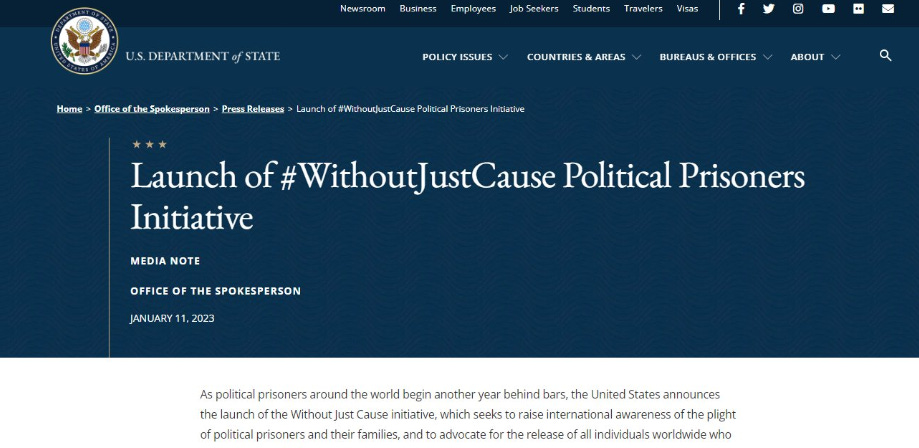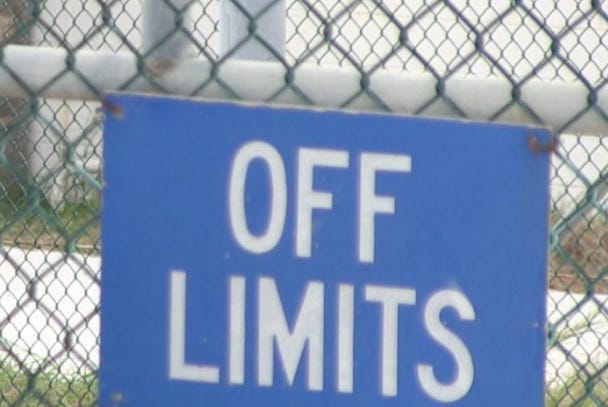#WithoutJustCause (but) Guantanamo Will Be Bigger: 21 Years Goes On
With hashtag #WithoutJustCause , a new U.S. State Department initiative, announced today, seeks to raise international awareness of the plight of political prisoners and their families, and to advocate for the release of all individuals worldwide who are detained unfairly, on the same day as 21st anniversary of Guantanamo. The U.S. government notice to the war court -- submitted 228 days ago, on May 20 -- that Guantanamo's most clandestine, CIA run prison, Camp 7, was too dangerous for inspection.
The Pentagon closed it a year early, and the military sent in crews to have it "sanitized." Raw sewage had sloshed through the tiers, the power sometimes went out and some cell doors would not close at the site.
They made history as Guantánamo Bay detainees who won a Supreme Court victory over George W. Bush, stripping the government of unchecked authority to hold people there. Now, 21 years after the prison opened, two former prisoners are rebuilding their lives.
On the 21st anniversary (Bush Jr initiative) of the first orange-jumpsuit clad “unlawful enemy combatants” arriving blindfolded and shackled to the U.S. naval base in Guantánamo Bay, more than 150 international human rights organizations are urging President Joe Biden to finally shutter the prison. The letter, coordinated by the Center for Victims of Torture, or CVT, and the Center for Constitutional Rights, calls for a closure to the current prison, an end to the indefinite military detention of the men living there, and a pledge to never again use the naval base for “unlawful mass detention.” Sept. 11 case prosecutors are awaiting a Biden administration position on issues in ongoing discussions towards a plea agreement. The judge has ordered prosecutors to update him every two weeks.
Contrary: The U.S. military is planning a new $435M health care facility at Guantánamo Bay up a hill from the McDonalds whose specs, paradoxically, envision caring for hundreds of prison guards but no particular care for aging war on terror detainees in 2029. The plan for the new care facility assumes the Biden administration fails in its stated goal of ending detention operations at the U.S. Navy base at Guantánamo Bay. It is part of the ad hoc nature of military planning for the prison operation currently holding 35 detainees.
Guantanamo Bay is one of the most notorious examples of how the public narrative has justified the detention, torture, and murder of Muslim men by constructing them as inherently terroristic and irredeemable". Thirty-five men remain there. The joint House-Senate FY23 National Defense Authorization Act adds Afghanistan to the list of nations that are off limits for repatriation or resettlement of detainees now at Guantanamo Bay. Already listed: Libya, Somalia, Syria and Yemen. The prison at Guantánamo has secretly reduced its staff to 1,000 U.S. troops and other U.S. government employees. That’s 500 fewer than in April — and a ratio of 28 guards and other personnel for each detainee at the 20-year old prison. Pentagon shuttle has reached Guantánamo Bay with about 100 court- and prisoner-visit bound passengers. We had a bumpy first leg but the flight was mostly smooth. Inflight meal: Pulled pork (forbidden for Muslim, but mostly for Gitmo staff) or chicken and rice.
“It is long past time for both a sea change in the United States’ approach to national and human security, and a meaningful reckoning with the full scope of damage that the post-9/11 approach has caused,” the letter says.
Following a slow trickle of transfers out of the facility under the Biden administration, 35 men remain imprisoned today. Over the last two decades, 779 men and boys passed through the catastrophic prison. Of those who remain there today, 20 are eligible for transfer out of indefinite detention; three are awaiting judgment from six different government agencies, known as the Periodic Review Board; three more have been convicted; and nine are involved in pre-trial hearings in the flawed military commission system. The case against accused 9/11 mastermind Khalid Sheikh Mohammed and his co-conspirators is ongoing and has not yet reached trial.
In the post-9/11 era, torture with impunity at CIA black sites, the failed invasions of Afghanistan and Iraq, drone strikes, botched raids across a global battlefield, domestic surveillance of Muslims, and the incalculable loss of civilian life in the Middle East have defined America’s quest for national security. But Guantánamo Bay, and its earlier iteration as a detention facility for Haitian refugees in the ’90s, “is the iconic example of the abandonment of the rule of law,” the letter argues.
“The world knows detainees were tortured, [as well as] the heinous methods, names of those who approved and participated, and that videotapes of torture were deliberately destroyed; yet not a single person has been held accountable,” Yumna Rizvi, policy analyst for CVT, told The Intercept. “The fact that all those complicit remain free, [and that] some even describe what they did without fear of prosecution, is astounding. The U.S. has lost its credibility for human rights, justice, and accountability.”
Renewed pressure and calls for the prison to finally be closed are only the beginning of ending the injustice, argues CAGE’s Mansoor Adayfi. “We need to see compensation, acknowledgement, and an apology for what happened to us,” Adayfi, a former Guantánamo prisoner, explain. “This is part of closing Guantánamo.”






